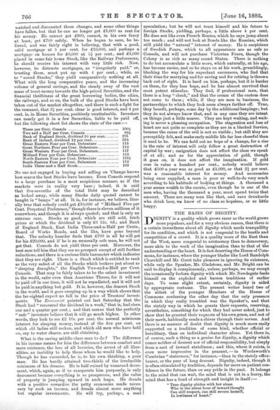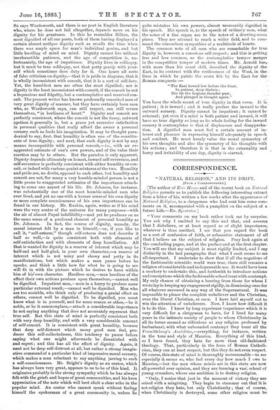THE BASIS OF DIGNITY.
DIGNITY is a quality which grows rarer as the world grows more populous, and for a very obvious reason, that there is a certain inwardness about all dignity which needs tranquillity for its condition, and which is not congenial to the bustle and competition of a crowd. It is a quality more of the East than
of the West, more congenial to aristocracy than to democracy, more akin to the work of the imagination than to that of the understanding or the heart. It is fast deserting the House of Com- mons, for instance, where the younger blades like Lord Randolph Churchill and Mr. Gorst take pleasure in ignoring its existence, while only the Speaker, Mr. Gladstone, and Mr. Bright can be said to display it conspicuously, unless, perhaps, we may except
the Occasionally forlorn dignity with which Mr. Newdegate feeds himself on the exploded and barren traditions of earlier days. To some slight extent, certainly, dignity is aided
by appropriate costume. The present writer heard two of the ablest of the younger Members of the House of Commons confessing the other day that the only presence in which they really trembled was the Speaker's, and that the stately way in which he grants their requests, reserving, nevertheless, something for which they had never asked, just to show that he granted their requests of his own grace, and not of their merit, habitually sends a shiver through their nerves. And there is no manner of doubt that dignity is much more easily supported on a tradition of some kind, whether official or hereditary, than on individual character alone. Yet there is, of course, such a thing as a genius for dignity, a dignity which comes neither of descent nor of official responsibility, but simply from a sort of inward stateliness ; and this, where it exists, is even more impressive in the peasant, — in Wordsworth's Cambrian " statesmen," for instance,—than in the stately office- bearer, or the peer of long descent. Dignity, indeed, though it is often stimulated by tradition, depends far more on patient con- fidence in the future, than on any pride in the past. It belongs to the mind that can wait, the mind that is not in a hurry, the mind that has a fund of strength and insight in itself :-
" True dignity abides with her alone Who in the silent hour of inward thought Can still respect, can still revere herself, In lowliness of heart." So says Wordsworth, and there is no poet in English literature who, where he does not fail altogether, depends more on his dignity for his greatness. In this he resembles Milton, the most dignified of all our poets, both of them having displayed a certain almost antique dignity such as recalls the time when there was ample space for man's individual genius, and but little hustling of mind on mind. Dignity cannot live without inexhaustible patience, and the age of competition is, un- fortunately, the age of impatience. Dignity lives in soliloquy, but it must be true soliloquy, not that petty gossip with your- self which sometimes does duty for it. One hears all sorts of false criticism on dignity,—that it is pride in disguise, that it is wholly inconsistent with conceit, that it is a sort of self-love. Yet, the humblest men are often the most dignified ; nor is dignity in the least inconsistent with conceit, if the conceit be not a loquacious and fidgetty, but a contemplative and reserved con- ceit. The present writer has known profoundly conceited men of very great dignity of manner, but they have certainly been men who, as Wordsworth says, can still respect, can still revere themselves, "in lowliness of heart." Dignity and conceit are perfectly consistent, where the conceit is not the fussy, outward egotism it generally is, but a grave yet excessive satisfaction in personal qualities that really afford the owner a personal scenery such as feeds his imagination. It may be thought para- doxical to say, first, that humility is often one of the constitu- ents of true dignity ; and next, that such dignity is not by any means incompatible with personal conceit,—i.e., with an ex- aggerated estimate of one's own powers, and of the value their exertion may be to others. But the paradox is only apparent, Dignity depends ultimately on honest, inward self-reverence, and Self-reverence is perfectly consistent with either humility or con- ceit, or indeed with various quaint mixtures of the two. Humility and pride are, no doubt, opposed to each other, but humility and conceit are not,lor many a very humble-minded person is not a little prone to exaggerated estimates of the importance attach- ing to some one aspect of his life. Dr. Johnson, for instance. was substantially one of the most humble-minded men who ever lived, and yet no one with a keener sense of his own dignity or more complete consciousness of his own importance can be found in our history. Mr. Ruskin, again, writes as if his mind were the very centre of the universe for many purposes—with the air of almost Papal infallibility—and yet he produces on us the same sense of a profound element of personal humility as Dr. Johnson. In fact, the source of dignity, namely, the moral interest felt by a man in himself,—or, if you -like to call it, "self-esteem," though self-esteem does not describe it half as well,—is quite consistent both with elements of self-satisfaction and with elements of deep humiliation. All that is wanted for dignity is a reserve of interest which may be half-sad and half-glad, in your own character,—a reserve of interest which is not noisy and showy and petty in its manifestations, but which makes a man pause before he speaks, and think a little how far what he is going to see will fit in with the picture which he desires to have within him of his'own character. Heedless men,—men heedless of the effect their own actions produce upon themselves,—cannot well be dignified. Impatient men,—men in a hurry to produce some particular external result,—cannot well be dignified. Men who are too sociable, who think only of producing a genial effect on others, cannot well be dignified. To be dignified, you must know what is in yourself, and for some reason or other,—be it noble, or be it commonplace,—attach a considerable importance to not saying anything that does not accurately represent that true self. But this state of mind is perfectly consistent both with very deep humility, and with a very considerable amount of self-conceit. It is consistent with great humility, because that deep self-distrust which many good men feel, pro- duces this self-collectedness, this tendency to pause before saying what one might afterwards be . dissatisfied with and regret ; and this has all the effect of dignity. Again, it need not be deep self-distrust at all, but rather a strong imagin- ative command of a particular kind of impressive moral scenery, which makes a man reluctant to say anything jarring to such a self-consciousness. Mr. Bright's dignity as an orator, which has always been very great, appears to us to be of this kind. It originates probably in the strong sympathy which he has always felt with the griefs and hopes of great communities, and his keen appreciation of the note which will best elicit a clear echo in the popular mind. An orator who cannot speak without feeling himself the spokesman of a great community is, unless he
quite mistakes his own powers, almost necessarily dignified in his speech. His speech is, to the speech of ordinary men, what the notes of a fine organ are to the notes of a drawing-room piano. They are attuned to reach a wider field, and to com- mand the concordant sympathies of a multitude of hearts.
The common note of all men who are remarkable for true
dignity is, however, a conscious self-respect; and'this in getting less and less common, as the contemplative temper merges in the competitive temper of modern times. Mr. Arnold has, with more than his usual skill, described the dignity 'of the, East, in its contrast with the restlessness of the West, in the lines in which he paints the scorn felt by the East for the Roman conquests :- " The East bowed low before the blast, In patient, deep disdain ; She let the Legions thunder past, And plunged in thought again."
You have the whole secret of true dignity in that verse. It is patient ; it is inward ; and it really prefers the inward to the outward scenery. Dignity cannot be impatient ; it cannot be external ; yet even if a mind is both patient and inward, it will have no true dignity so long as its whole feeling for the inward scenery it contemplates is that of displeasure and disapproba- tion. A dignified man must feel a certain amount of in- terest and pleasure iu expressing himself adequately in speech and conduct. He must keenly value the moral symmetry of his own thoughts and also the symmetry of his thoughts with his actions ; and therefore it is that in the externality and hurry and irritability of our day, dignity is starved.



































 Previous page
Previous page